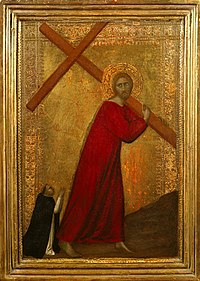

Barna da Siena, also known as Berna di Siena, was presumed to be a Sienese painter active from about 1330 to 1350.
The painter was first referred to by Lorenzo Ghiberti in his I Commentarii (mid 15th century) as a Sienese painter who painted several works in Tuscany, including many stories from the Old Testament in San Gimignano. Giorgio Vasari referred in the first edition of his Lives of the Most Excellent Painters, Sculptors, and Architects (1550) to the Sienese painter ‘Berna’ who was responsible for frescos of Old Testament scenes in the Collegiata di San Gimignano. In the second edition of the Vite (1568) Vasari only connected the artist with the New Testament scenes in that church, dating them to the very end of Barna’s life, apparently to 1381.
Because of the wide variations in style and quality in the New Testament paintings in San Gimignano it is believed that they were the work of three or four distinct painters. It is further believed that Vasari's dating of the New Testament scenes was incorrect as on stylistic grounds they should be dated to the period 1330-1340s. Because of these problems with the identification of the artist a majority of scholars now believe that ‘Barna’ is a historical fiction. This conclusion has generated various theories on the authorship of the San Gimignano frescoes. The view is that the Collegiata frescoes and other panel paintings attributed to the artist are all closely linked to the work of followers of Simone Martini and the circle of Lippo Memmi.[1]
- ^ H. B. J. Maginnis. " Barna." Grove Art Online. Oxford Art Online. Oxford University Press. Web. 25 Feb. 2016